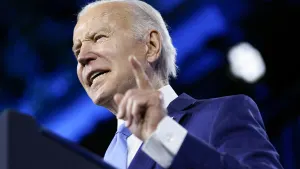More Stories

Vladimir Putin put his nuclear forces on increased alert on Sunday in an unprecedented escalation of tension with the West since the collapse of the Soviet Union over Russia’s massive conventional assault of Ukraine, which entered its fourth day with fighting in the streets of the country’s second-largest city.
LIVE UPDATES: The latest developments on the Russia-Ukraine Crisis
Here are the things to know about the Russian invasion of Ukraine and the security crisis in Eastern Europe:
RUSSIA PUTS NUCLEAR FORCES ON ALERT
In a shocking move that immediately unearthed fears many thought permanently buried from the Cold War of the previous century, Putin ordered Russian nuclear weapons prepared for increased readiness to launch, ratcheting up tensions with Europe and the United States over the conflict that is dangerously poised to expand beyond the former frontiers of the defunct U.S.S.R.
The Russian president told his defense minister and the chief of the military’s General Staff to put the nuclear deterrent forces in “special regime of combat duty.”
He said that leading NATO powers had made “aggressive statements” toward Russia in addition to stiff economic sanctions and cutting leading Russian banks from the SWIFT banking system.
RUSSIA AND UKRAINE TO HOLD TALKS
After rejecting Putin’s offer to meet in the Belarusian city of Homel on the grounds that their common neighbor was facilitating the Russia assault, Ukrainian president Volodymyr Zelenskyy agreed to send a Ukrainian delegation to meet with Russian counterparts at an unspecified time and location on the Belarusian border.
The announcement comes hours after Russia announced that its delegation had flown to Belarus to await talks. Ukrainian officials initially rejected the move, saying any talks should take place elsewhere than Belarus, a country that has supported Putin directly by allowing Russia to use its territory as a staging ground.
Zelenskyy, who has refused to abandon Kyiv, named Warsaw, Bratislava, Istanbul, Budapest or Baku as alternative venues for talks, before accepting the Belarus border.
The Kremlin added later that Israeli Prime Minister Naftali Bennett had offered to help broker an end to fighting in a call with Putin. It didn’t say whether the Russian leader accepted.
FIGHTING SPREADS
Attempting to lay siege to Ukraine’s capital, Kyiv, Russian forces focused on cutting off the country’s southern coast and isolating it from the sea, while also probing the inner defenses of Kharkiv.
Ukrainians awoke Sunday to street fighting in the northeastern city of 1.4 million located about 20 kilometers (12.4 miles) south of the border with Russia. Regional authorities administration said that Ukrainian forces had engaged Russian troops inside the city and asked civilians not to leave their homes.
The immediate fate of the Russian advance was uncertain, but with Ukrainians volunteering en masse to fight back alongside regular army units, it seemed that the city’s defenses offered stiff resistance. Having already ordered men between 18-60 years old not to leave the country, Ukrainian officials said Sunday that they were releasing prisoners with military experience who want to take up arms for their country.
The ground attack came after Russians blew up a gas pipeline in Kharkiv, according to Ukrainian officials who ordered residents to cover their windows with a damp cloth given the “environmental catastrophe” it posed.
Britain’s defense ministry said that while overnight skirmishing in Kyiv had been less intense than on Friday night, Russian forces were attempting to encircle the city. The capital remains under lockdown after its mayor called a curfew from 5 p.m. Saturday until 8 a.m. Monday.
Kyiv mayor Vitali Klitschko on Sunday told The Associated Press that he estimated some of the Russian attackers are within 20 kilometers (12 miles) of the city center and that he feared for a long siege.
“Right now, we have electricity, right now we have water, and heating in our houses, but the infrastructure is destroyed ... I guess we have not so much time,” Klitschko said.
MOST FLEE, SOME RETURN TO FIGHT
Those fleeing Europe’s largest armed conflict since World War II grew to 368,000 Ukrainians — mostly women and children — who have reached neighboring countries, the United Nations’ refugee agency said. That figure more than doubles the agency’s estimate from the day before.
The line of vehicles at the Poland-Ukraine border stretched 14 kilometers (8.7 miles), and those fleeing had to endure long waits in freezing temperatures overnight. Over 100,000 people have crossed into Poland alone, according to Polish officials.
Amid the rush to escape the bombs and tanks, there was also what looked like a trickle of brave men and women who want to head home to defend Ukraine or help others do so.
At a border crossing in southern Poland, Associated Press journalists spoke to people in a line heading against the tide. They included a group of some 20 Ukrainian truck drivers who worked in Europe and wanted to face combat.
GERMAN MILITARY SHIFT
A day after Germany announced it would send military aid to Ukraine, German Chancellor Olaf Scholz said that his government will increase its own defense spending to rearm amid the uncertainty of the extent of Putin’s ambitions.
Scholz’s pledge to dedicate 100 billion euros to a special fund for its armed forces would raise Germany’s defense spending above 2% of GDP, finally satisfying a longstanding request by NATO allies for Europe’s largest economy to do more for the continent’s security.
Late on Saturday Germany announced that it would send 1,000 anti-tank weapons and 500 “Stinger” surface-to-air missiles to Ukraine. Those weapons are in addition to the 400 German-made anti-tank weapons Germany also approved to be shipped from the Netherlands, as well as 9 D-30 howitzers and ammunition from Estonia.
RUSSIANS AGAINST THE WAR
Defying crackdowns by police, demonstrators marched in city centers from from Moscow to Siberia chanting “No to war.”
In St. Petersburg, where dozens gathered in the city center, police in riot gear grabbed protesters and dragged some to police vans, even though the demonstration was peaceful. According to the OVD-Info rights group that tracks political arrests, by Sunday afternoon police had detained at least 356 Russians in 32 cities over anti-war demonstrations.
MORE CLOSE AIRSPACE TO RUSSIA
Italy and Austria joined a growing list of European countries to have closed their airspace to all Russian aircraft. They follow Britain, Germany, the Czech Republic, Poland, Slovenia, Estonia, Latvia, Lithuania, Romania and Luxembourg.
___
More from News 12
2:25
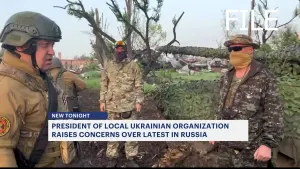
Westchester Ukrainian org chief questions validity of Putin-Wagner deal that ended brief uprising
1:54
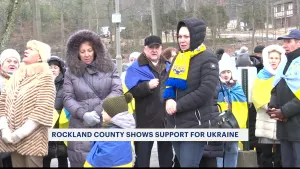
Rockland residents show support for Ukraine as world marks 1 year since Russian invasion
2:23
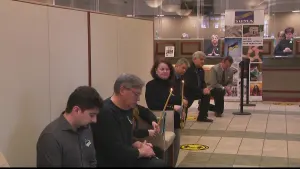
Hudson Valley marks one year since Russia invaded Ukraine
1:59
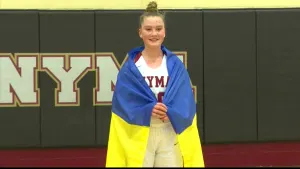
15-year-old girl transfers to Hudson Valley to play basketball due to war in Ukraine
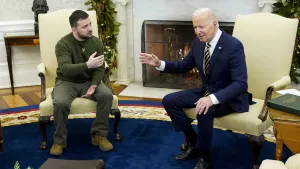
Zelenskyy thanks 'every American,' sees 'turning point'
